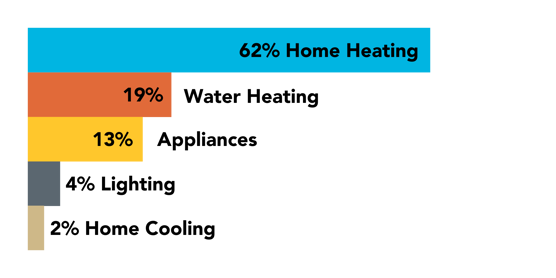Heating your Home
Did you know that heating your home accounts for almost 62% of yearly energy use for the average Canadian home? Water heating is a close second, accounting for about 19%. The first and most important step to help lower energy consumption for your home is to make sure your building envelope is performing at its best. This means sealing air leaks, improving your insulation, and installing ENERGY STAR® rated doors and windows.

Tips to save on home heating costs
- Insulate your attic, ceiling, exterior and basement walls, floors and crawl spaces. You could save 225 kWh per month, or $345 over the entire heating season.*
- Caulk and weatherstrip around doors, windows and attic hatches. You could save 90 kWh per month, or $138 over the entire heating season depending on how drafty your home is.*
- Lower the thermostat by 5°C when you leave home for the day and when you go to bed. You could save 90 kWh per month, or $138 per year.*
- Turn off your electric fireplace one hour earlier each night, you could save 31 kWh per month, or $47 per year.*
- Keep your baseboard radiators clear. For example, don’t put a sofa in front of your radiator as it will absorb a lot of the heat.
- Use insulated blinds (or heavy curtains) during the winter. Close them at night so heat doesn’t escape through the windows.
- Schedule an annual tune-up for your furnace with a qualified technician to make sure your system is running efficiently.
* Heating season in PEI is approximately eight months, assumes electric baseboard heating (to calculate savings using furnace oil note that one litre of oil = 8.5 kWh)
* Energy cost per year based on Maritime Electric residential first block energy charge of $0.1667/kWh.
Tips to save on hot water heating costs
- Insulate or wrap your electric hot water heater and the first two meters of pipes running to and from. You could save 22 kWh per month, or $45 per year.* Make sure to follow manufacturer’s instructions or contact a professional.
- Lower the temperature on your hot water heater by 5°C. You could save 18 kWh per month, or $37 per year.*
- Consider purchasing an ENERGY STAR® “Most Efficient” front-loading clothes washer. They use 45% less water and 25% less energy than top-loading models.
- Use the economy setting on your clothes washer and wash and rinse laundry in cold water. You could save 48 kWh per month, or $99 per year.*
- Install aerating, low flow faucets to reduce hot water consumption. Repair any leaky faucets for even more savings!
- Lower the temperature on your hot water heater or boiler to 130°F (55°C). You’ll save money and it’s safer for kids and seniors.**
- Shorten your shower to five minutes and install a low-flow showerhead. You'll reduce your water consumption and you could save 32 kWh per month, or $66 per year.*
- If your family uses a lot of hot water, consider installing a solar hot water system.
* Energy cost per year based on Maritime Electric residential first block energy charge of $0.1723/kWh.
**The Canada Safety Council recommends a temperature setting no lower than 54°C for electric hot water heaters
Savings and tips for mini-split heat pumps
- Install an ENERGY STAR® “Most Efficient” ductless mini-split air-source heat pump. You can save $1,099 per year if you currently use electric baseboard radiators to heat your home.*/**
- Install an ENERGY STAR® “Most Efficient” ductless mini-split air-source heat pump. You can save $768 per year if you currently use furnace oil to heat your home.*/**
- Choose an ENERGY STAR® "Most Efficient" rated air-source heat pump to ensure it will operate and provide heat at temperatures as low as -25°C. You may also qualify for a rebate from EfficiencyPEI.
- Choose an authorized mini-split dealer that only employs certified installers licensed to handle refrigerants and work with electrical connections.
- Choose the right size heat pump. It is recommended that you speak with a certified heat pump installer or authorized dealer to better determine the most appropriate size unit for your home.
- Keep your existing electric baseboard heaters or oil-fired furnace. Even the most efficient heat pumps available today should be viewed as supplemental heating systems only.
- Set the thermostat at the temperature you desire on either heat or cool mode and leave it there. It is not advisable to set your heat pump on auto or reduce the thermostat by more than 1°C.
- Upgrade to a 200 amp service if you are installing more than one mini-split air-source heat pump.
* Energy cost per year based on Maritime Electric residential first block energy charge of $0.1437/kWh.
** Estimated amount for space heating only (1,200 square foot bungalow), total furnace oil usage will be higher if furnace oil also used to heat hot water.
Tips to save on home cooling costs
- Consider using a fan instead of an air conditioner or open the windows to allow air to flow through your home.
- Keep blinds and curtains closed during the hottest part of the day to stop the sunlight from heating up your home.
- Planting trees or shrubs in your yard can help provide shade to your home, reducing costs associated with cooling.
- Try to keep your thermostat out of direct sunlight.
- If you have an air conditioner, set the temperature to 25°C (77 °F) or higher during the summer months.
- If you’re looking to buy an air conditioner, look for one that is ENERGY STAR® certified or ENERGY STAR® “Most Efficient.” ENERGY STAR® certified air conditioners use 10% less energy than a standard model.
- Make sure you seal any gaps with the panels and side curtains provided with your air conditioner. Seal up any remaining cracks using a peelable caulk to stop air leaks.



